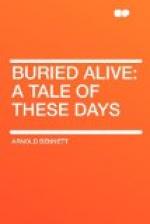“Look here,” he said to Priam; “what the devil do you want?”
“What the devil do I want?” repeated Priam, who had not yet altogether fallen away from his mood of universal defiance. “I only want to know what the h-ll this building is.”
The fat man was a little startled. He took his pencil from his mouth, and spit.
“It’s the new Picture Gallery, built under the will of that there Priam Farll. I should ha’ thought you’d ha’ known that.” Priam’s lips trembled on the verge of an exclamation. “See that?” the fat man pursued, pointing to a small board on the hoarding. The board said, “No hands wanted.”
The fat man coldly scrutinized Priam’s appearance, from his greenish hat to his baggy creased boots.
Priam walked away.
He was dumbfounded. Then he was furious again. He perfectly saw the humour of the situation, but it was not the kind of humour that induced rollicking laughter. He was furious, and employed the language of fury, when it is not overheard. Absorbed by his craft of painting, as in the old Continental days, he had long since ceased to read the newspapers, and though he had not forgotten his bequest to the nation, he had never thought of it as taking architectural shape. He was not aware of his cousin Duncan’s activities for the perpetuation of the family name. The thing staggered him. The probabilities of the strange consequences of dead actions swept against him and overwhelmed him. Once, years ago and years ago, in a resentful mood, he had written a few lines on a piece of paper, and signed them in the presence of witnesses. Then nothing—nothing whatever—for two decades! The paper slept... and now this—this tremendous concrete result in the heart of London! It was incredible. It passed the bounds even of lawful magic.
His palace, his museum! The fruit of a captious hour!
Ah! But he was furious. Like every ageing artist of genuine accomplishment, he knew—none better—that there is no satisfaction save the satisfaction of fatigue after honest endeavour. He knew—none better—that wealth and glory and fine clothes are nought, and that striving is all. He had never been happier than during the last two years. Yet the finest souls have their reactions, their rebellions against wise reason. And Priam’s soul was in insurrection then. He wanted wealth and glory and fine clothes once more. It seemed to him that he was out of the world and that he must return to it. The covert insults of Mr. Oxford rankled and stung. And the fat foreman had mistaken him for a workman cadging for a job.
He walked rapidly to the bridge and took a cab to Conduit Street, where dwelt a firm of tailors with whose Paris branch he had had dealings in his dandiacal past.
An odd impulse perhaps, but natural.
A lighted clock-tower—far to his left as the cab rolled across the bridge—showed that a legislative providence was watching over Israel.




